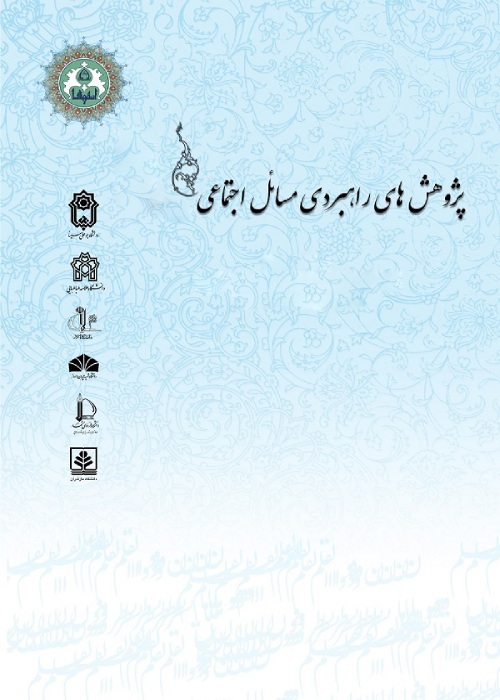The Grounds and Implications of Social Order: A Qualitative Study of NAJA Staffs
The law enforcement is considered as one of the official providers of social order. According to empirical evidence, there is a type of skepticism amongst people and the community against law enforcement organizations; the majority of complaints have been posed with regards to police stations and the road police. The dominant approach employed in the existing research on the role and position of police in social security and order involves a quantitative, extrinsic nature. Furthermore, the audience in such studies mainly included people and the society (e.g. Doosti & Fallahi, 2015; Habibzadeh & Soltani, 2016; Kamran & Ahmadian, 2009; Saei & Bakhshi, 2012), while studying the NAJA staffs themselves as providers of social security and order has been overlooked. The present study seeks to delve into the world of the NAJA staffs using the qualitative method. The study of backgrounds and semantic implications of order from the perspective of NAJA staffs could be very beneficial for understanding and analyzing social order in a society where order is retained majorly by organizations supervised by NAJA. It could also contribute to the reformation of administrative structures and providing an exquisite approach and insight within the police force on how to provide and retain security and order through an interactive and participatory approach in the society. This issue is of particular significance in the case (Shahin Dezh) studied in the present research due to its multicultural and multiethnic texture.
In this study, it is attempted to explore social order from the view of the NAJA staffs. Given the complexity, sensitivity and contextual nature of social order, the qualitative method is more suitable. In addition, the Grounded Theory method was used to examine the backgrounds and constitutive conditions of social order. The case studied in this inquiry was the law enforcement staffs of Shahin Dezh city, located in Western Azerbaijan province. One of the requirements for participants was to have a minimum service period of ten years. The sample size in this study depended on the saturation limit intended for theoretical conclusion which was attained during the research process. Subsequently, 32 semi-structured interviews were conducted with the law enforcement agents of Shahin Dezh.Since the purpose of the Grounded Theory is theorization or theoretical analysis, the theoretical sampling method was employed. As for the interviews, subsequent interviewees were selected using the sampling method with maximum diversity. To this end, interviews were conducted with agents with distinguished level of education, and different military, occupational, organizational and ethnic positions. Following the interviews, data were analyzed through open, axial and selective coding.
According to field studies and data collected from interviews with a sample selected from the NAJA staffs, it was observed that social order involves multiple meanings. The negative aspect of social order involves supervision over dealing with norm breakers, uncompromising attitude towards those who disrupt social order, and extrinsic protection. The positive aspect involves cooperation between various social groups and strata.While regarding social order as essential, the interviewees also considered the law enforcement as one of the providers of social order and asserted the necessity of cooperation between people and the law enforcement. In the case studied in this inquiry, people’s participation was mostly manifested as a general form through authorities of power, i.e. elders and religious scholars. Moreover, the law enforcement cooperation were focused on institutions such as schools and mosques while civil entities were not at a significant position to construct social order.According to the views of the NAJA staffs, there are a set of backgrounds and conditions for providing social order which include intrinsic and extrinsic protection, preventive measures, culturalization, contingency actions, and work ethics; at the macro level, these include deepening the citizenship dimensions, institutional cooperation, absence of institutional/functional conflicts between official social order organizations, and integration of rules.
As for interactions, it was shown that the NAJA staffs consider resorting to strategies such as building institutional confidence, accepting criticisms, flexibility in methods, organizational improvement, and procedural justice as necessary for providing social order. Accordingly, concepts and notions derived from the world of NAJA staffs denote “low political, behavioral, and ideological tolerance”. Such a perception somehow involves pessimism and skepticism towards various cultural tastes and interests, and different lifestyles; it is closer to the negative aspects of social order. As a consequence, low levels of political, behavioral, and ideological tolerance has resulted in a number of problems in social order. Such an order constitute enforcement-related elements and components such as order from the top, reliance on rules and prescriptive nature. Therefore, given the views of the NAJA staffs, social order cannot be retained solely through mediation by Force majeure, and requires preventive approaches, culturalization, and social cooperation. The NAJA staffs’ emphasis on the necessity of inclusive and integrative backgrounds, social capital and flexibility in strategies as components of order derived from the community (coherent order) shows the inefficient, problematic order that is present in the society. According to the data, the core category was extracted, that is, “the problematized social order”, implying the compulsory and social aspects of the social order.
- حق عضویت دریافتی صرف حمایت از نشریات عضو و نگهداری، تکمیل و توسعه مگیران میشود.
- پرداخت حق اشتراک و دانلود مقالات اجازه بازنشر آن در سایر رسانههای چاپی و دیجیتال را به کاربر نمیدهد.



